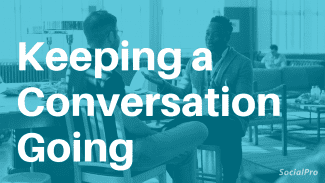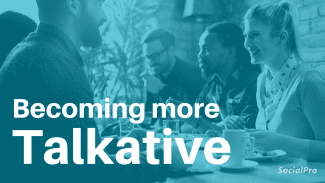“I don’t talk much. I feel like I’m too quiet and boring and like people don’t want to talk to me because I’m so quiet. Why don’t people like quiet people, and what should I do about it?”
Do you feel socially awkward speaking in front of groups or end up tripping and stumbling over your words? Perhaps you think that you have nothing of worth to add to a conversation with others. Maybe it feels like people believe that you’re strange because you’re quiet.
After reading this guide, my hopes are that you will have more of an understanding of what people have against quiet people, why you might be quiet, and what to do about it.
Why do people dislike a quiet person?
Quiet people often observe first and only talk when they have something to say. Some can find this unsettling – they don’t know what you’re thinking, and this may make them uncomfortable.
People’s discomfort around quiet people can also be cultural; western society portrays successful and outgoing people as outgoing and exuberant. Yet, studies have shown that even though being friendly is seen positively by others in western cultures, in China, shyness is more valued than confidence.[1]
However, studies have also shown that more outgoing young adults are happier in later life than their quieter peers.[2] Therefore, the secret to a more contented life may lie in finding ways to become more socially confident.
Sometimes it’s hard to know if people dislike us or if it just feels that way. See our guide on how to tell if people don’t like you. You can also do our quiz covering reasons why someone may not like you.
Sections
Reasons for why you might be quiet
Understanding the reasons for not speaking much can help you be more outgoing.
Introversion
Being introverted and being quiet isn’t the same thing, but it’s common for us introverts to be quieter. Being silent might be an introvert’s default position and where they feel at their most comfortable. Introverts tend to initiate conversations less and often energize from being alone rather than through social interaction.[4]
It’s how we’re wired, and it is a normal and healthy way to be. However, others may be quiet because they’re intimidated by social situations and fear being thought of as weird or stupid for saying the wrong thing. Their quietness is more likely the result of anxiety.
Social anxiety
Sometimes people think they are introverts when in reality they suffer from social anxiety. Introversion is born into you – it’s an inherent part of your personality. On the other hand, social awkwardness or social anxiety is the result of a cocktail of your genetics and experience. You can even be an extrovert and have social anxiety.
The main difference between being quiet because it’s your natural preference and being quiet because you’re socially anxious is fear. If your motivation for not wanting to speak in social circumstances is driven by fear, whether it’s a gut-clenching phobia of being judged, whether you worry about getting to know people in case they get to know the real you, or you dread sounding stupid in front of others, then you may have social anxiety.
Signs that you could have social anxiety:
- You avoid situations, even if it means potentially missing out on valuable opportunities for personal growth.
- You don’t enjoy yourself even when you’re alone – you still can’t relax, and you feel distracted and fidgety.
- Alone time doesn’t recharge you. Unlike introverted people, you still feel exhausted after being by yourself because your mind can’t relax.
- You only have specific people that you feel comfortable around. They may be people that have proven to you in the past that they already value and accept you, therefore removing the need to feel anxious.
- There are only a few places in which you feel relaxed. Similar to people, new places can be daunting, causing you to feel unsure and anxious.
See our guide on how to feel less nervous around people.
How to be less quiet
Maybe your boss or friends says that you’re too quiet, or perhaps you find it difficult to strike up a conversation with someone you don’t know. You’re not alone in feeling like this, but even though you prefer to keep to yourself doesn’t mean that you always should; there will be situations that may require you to be chattier and more outgoing.
Also, see our main guide on how to stop being quiet for more advice.
Take small steps outside of your comfort zone
Over time, as you develop your skills, try to involve yourself in more challenging situations. This might mean that you have to step out of your comfort zone slightly, but the more you challenge yourself, then the more confident you’ll become.
As an example, if you usually don’t interact at all with your coworkers, leave your phone at your desk during lunch and exchange a few words with whoever’s around. Or, if you usually just respond “good” to “how are you?”, share in a sentence or two what you’ve been up to.
Use what’s going on around you as inspiration
Focus on what’s happening around you rather than what’s going on internally. If you find that you’re starting to feel anxious, focus on your surroundings. Focus on what other people are saying, what they’re wearing, their body language, and their facial expressions. Simple statements about your surroundings are powerful to signal that you’re friendly. This can work as inspiration for starting conversations: “It’s cold outside today”, “The food smells good”, “Is that a new jacket? I like it.”
Rather than trying to fabricate conversation starters, share your actual thoughts about what you experience, as long as they are positive.
Challenge your self-critical thoughts
The next time that you catch yourself thinking “People never listen to me anyway” or “I don’t want to talk to these people anyway”, challenge those thoughts. Have there been times where people have listened to you? Are you sure you don’t want to use this moment to practice talking to people?
Be mindful of your thoughts and feelings
Mindfulness is when you focus your attention on the now without judging it. It’s a powerful method to pick up on inner thoughts. By mindfully observing yourself, you can experience internal thoughts that otherwise would have passed you by. For example, you might find that you have a thought pattern that talks you out of interacting with people. You can then challenge these thoughts, as I talked about in the step above.
For advice on getting started with mindfulness and meditation, see this meditation guide by Mindful.org
Seek out places that are less loud
If you find that big, crowded spaces are not your thing, then it might be best to find a situation or location that suits you better. For example, you may not want to go to a concert, but you could suggest meeting someone on a one to one basis, such as in a coffee shop.
Use realistic affirmations
Perhaps your old way of thinking made you feel anxious. Try to come up with a new way of looking at the situation. You could even prepare some positive affirmations in advance. For example, if you feel like you’re not interesting enough for people to talk to, one affirmation could be “I can make valuable contributions”.
Affirmations need to feel credible to work.[3] This means that an affirmation like “I’m the most social person in the world” might make you feel worse about yourself. This guide from MindTools can help you to write your own affirmations.
Project your voice
Social anxiety, shyness, or a lack of confidence can cause you to speak softly and your voice will ultimately be drowned out in a group of outgoing people. In order to be heard, you may need to project your normal speaking voice. With plenty of practice, you can learn how to effectively project your voice so as to be heard by others in a group.
See our guide on how to speak louder.
Try therapy
If you find that fear is making you avoid social environments, or you think that you may be socially anxious, then you may find a talking therapy such as Cognitive Behavioral Therapy (CBT) to be a helpful route.
We recommend BetterHelp for online therapy, since they offer unlimited messaging and a weekly session, and are cheaper than going to a therapist's office.
Their plans start at $64 per week. If you use this link, you get 20% off your first month at BetterHelp + a $50 coupon valid for any SocialSelf course: Click here to learn more about BetterHelp.
(To receive your $50 SocialSelf coupon, sign up with our link. Then, email BetterHelp’s order confirmation to us to receive your personal code. You can use this code for any of our courses.)
How to be less quiet in the workplace
You might feel that your coworkers don’t like you because you’re quiet, or perhaps there’s a pattern to how you’re treated at work because your colleagues think that because you’re shy that you must be a pushover.
Being quiet can affect work-life as co-workers could potentially find someone quiet to be boring, socially inept, or lacking in personality. In these situations, a little socializing goes a long way:
- Get to know them as people instead of just work colleagues
- Say “yes” to the occasional after-work drink or social event
- Suggest going to lunch with someone you work with.
These steps will show that you are attempting to make an effort, and not only can it help you be more outgoing and likable, but research even shows that workers are happier in their jobs when they foster friendships with their co-workers, finding that people with a close friend at work are seven times more likely to be more content and efficient at their job.[3]
This way, you can change the way your colleagues see you without compromising who you are.
Talk to yourself like you would talk to a friend
Whether your reasons for being quiet are inherent or the result of your past experiences and fear, there is no reason for you not to be able to live a full, healthy, and happy life. If you decide that you want to make changes to how you approach social situations, the most vital aspect is to remember to treat and talk to yourself with kindness.
Think about how you would talk to a friend and how you would want them to speak to you; talk to yourself with the same level of compassion and patience. The bravery and confidence in social situations will soon follow suit. You may not be able to change who you are, but you can certainly change your outlook on the world.
When being quiet is a good thing
Sometimes, what we might perceive to be a weakness, can actually be a strength. There are some wonderful perks to being more silent than others; perhaps you thoroughly enjoy being an observer and listening to everyone else’s jokes and stories, as well as watching their mannerisms, style, and insecurities. You might also let ideas marinate more than your outgoing companions – therefore when you do speak, you offer up the best of what you have to give.
You can even use your natural traits to help you to foster more profound and meaningful connections in the following ways:
- It can be easier to get to know people on a deeper level when you’re quiet. Instead of always talking, you’re actively listening; asking questions about the other person means that you can learn about them. People value this in a friend.
- You could potentially be a great listener. People may even seek you out because they know that you would be an understanding ear.
- When you actually do talk, people will likely stop and listen. After all, it’s probably not often that you do so. This could mean that others see you as an insightful person and may come to you for advice.
- Quiet people can have more of a connection with their gut feeling and may be less likely to ignore when it is telling them that something is off. You can use this to your advantage when judging the intentions of another person.














This entire article is focused on ways to “cure” one’s “quietness”. As such, it is no better than the culture that defines being quiet as a bad thing in the first place. Introversion is not a disease that needs to be cured anymore than is blackness or gayness. It’s an inborn characteristic just like skin color or sexual preference. Thus discrimination against introverts should be just as illegal for employers as discrimination against race or sexual preference. But it’s not. Discrimination against the “quiet” is treated as a matter of course in corporate culture, and is quite often used as justification for refused promotions, firings and negative hiring decisions. This needs to be dealt with by a change in that culture, not by trying to force introverts to be “less introverted”.